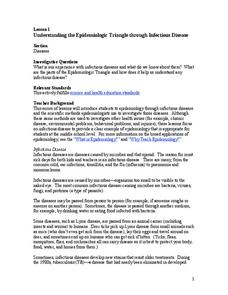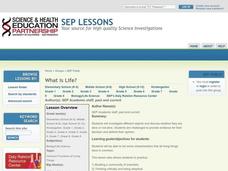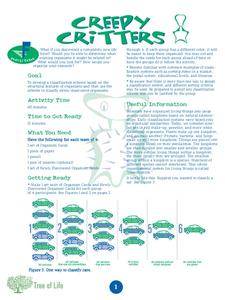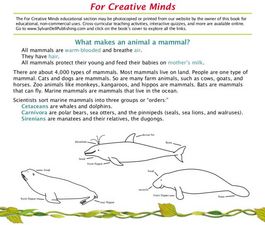Curated OER
Obtaining Food -- The Impact of Over-fishing
Students play a fishing game. In this food supply activity students regulate their fishing in a game about over-fishing. The students identify resources that could be extracted from that biome.
Curated OER
Honey Bee Biology
Students review the basic parts of an insect and explore the anatomical characteristics of a honey bee. The second part of the instructional activity focuses on ways to identify a honey bee from other stinging insects.
Curated OER
Habitats of the World
Students complete a unit of eighteen lessons that cover climate, geography, location, plants, and animals of each of the five habitats. They are also introduced to habitat destruction and discuss ways to protect the environment. They do...
Curated OER
Everything's Connected
Students explore how trash decomposes. In this ecosystem lesson, students discuss new vocabulary words, such as producers and consumers, and think critically to answer how landfills work.
Curated OER
Understanding the Epidemiologic Triangle through Infectious Disease
Learners examine the epidemiologic triangle. In this disease instructional activity, students discuss infectious disease as they study how they spread and discover their families' experiences with them. Learners research Internet sites...
Curated OER
What is in Soil?
Fourth graders identify and examine the components that make up soil. Individually, they use a magnifying glass to identify the organic and inorganic material in their soil sample. To end the lesson, they record the differences in the...
Curated OER
What is Life?
Students investigate the characteristics of living things. In this life science lesson, students examine several living and non-living specimens. Students determine which things are living and non-living.
Curated OER
Fruits and Vegetables in the Food System
Students examine the importance of local markets. In this horticulture lesson, students examine the importance of local markets and food systems that can provide profit for growers, freshness, variety and quality.
Curated OER
Forced to Flee: Famine and Plague
Students examine events the lead people to emigrate. In this Irish Potato Famine lesson plan, students research primary and secondary sources regarding the Irish Potato Famine and collaborate to create a classroom mural depicting the...
Curated OER
The Battle to Save Bats
Students investigate the disease that is causing the global decline of bats. In this animal health lesson, students read an article which discusses white-nose syndrome, the number one killer of bats. Students discuss ways to keep bats...
Curated OER
Microbes and Health
Sixth graders investigate microorganisms. In this Science lesson, 6th graders examine how microorganisms can be both positive and negative. Students list diseases caused by microorganisms.
Curated OER
Microorganism Multiplication
Sixth graders explore biology by viewing video clips in class. In this microorganism identification lesson plan, 6th graders identify the types of organisms that can feed small animals such as algae and protozoans. Students view video...
Curated OER
Life in a Log
Students identify insects living in rotting logs. In this decomposition lesson, students observe pieces of a rotting log, they look at the insects that have inhabited the log and create a chart that shows their findings.
Curated OER
Plant Galls
Students study what a plant gall is and the different types that there are. In this plant lesson students examine what causes galls and how to prevent them.
Curated OER
When Germs Attack!
Students explore the hidden world of microbes and how our bodies spring into action in response to diseases. This ten lesson unit presents data on several microbial diseases and the reaction of the body's immune system.
Curated OER
Creepy Critters
Students develop a classification scheme based on the structural features of organisms. In this organism lesson students divide into teams and complete a fun activity.
Curated OER
Creepy Critters
Students classify imaginary newly discovered organisms. For this classification lesson, students are given cards showing imaginary organisms that have been recently discovered. They must classify the organisms based on their...
Curated OER
Composting in Schools: Observing Compost Microorganisms
Learners explore composting. In this composting lesson, students use compound microscopes to observe the microbial communities in compost. Observations and documentation of changes will occur over the course of several weeks.
Curated OER
For Creative Minds: What Makes an Animal a Mammal?
Young scholars read about categories of mammals and their features. Students then construct a marine animal, using given print outs in the lesson. Young scholars then create adaptations for their mammal, using a web site reference for...
Curated OER
Biology Trivia
Students answer questions. In this biology lesson, students answer various questions pertaining to biology.
Curated OER
Microscope Investigation
Learners explore physical science by participating in a science examination. In this microscope tutorial lesson, students read the book The Naked Eye and discuss the purpose for using a microscope in the field of science. Learners...
Curated OER
Yeast Power!
Students examine how not all microorganisms are bad and that some can actually be beneficial. In this yeast lesson students complete an experiment with yeast and answer questions.
Teach Engineering
Breathing Cells
Pairs work together to determine whether unknown solutions are either acids or bases by using a red cabbage indicator solution. After determining the general pH of the unknown solution, classmates blow into the same indicator after...
Curated OER
Microorganism Multiplication
Seventh graders complete two experiments to learn about harmful and helpful microorganisms. In this microorganisms lesson, 7th graders read background information about fungi, yeast, and club fungi. Students then complete two experiments...

























